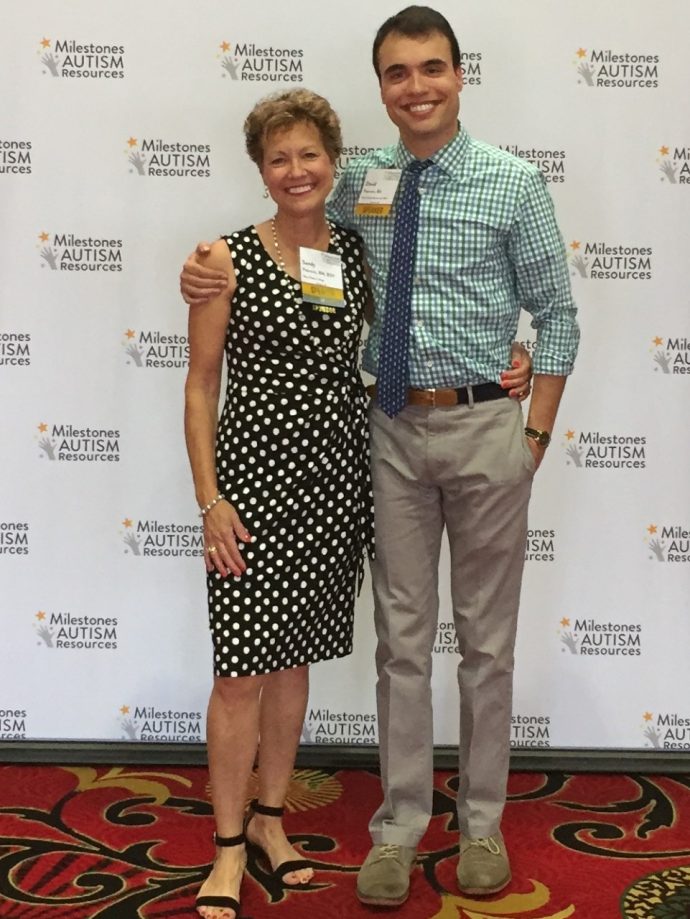The diagnosis of autism is based upon very specific criteria. However, the degree of severity in how the components present themselves vary considerably from person to person as well as within the same person for different categories. There is also great variation in how each autistic individual functions and in the level of support that is needed to match the severity of each component—hence, the word “spectrum.”
To summarize, each autistic person is different from every other autistic person, though some generalities may be shared. Despite this, when the word “autistic” is heard, a very specific picture comes to mind for many neurotypical people. My autistic son (David) and I aspire to dismantle this stereotypical thinking. We seek to educate on the realities and potentials of people on the autism spectrum, on why they do what they do, and what they need in order to optimally function in the typical world. Through our writings and public speaking, we seek to foster understanding and embracement of the autistic community.
Adding to the confusion in understanding autism, many of the challenges of autistic individuals are hidden, such as the differences in thinking, processing, and learning, to name a few. This often makes life harder in terms of others’ reactions or support. The social rules of interaction are not inherently known to autistic people—they must be learned. Communication and socialization are likely problematic, despite the level of intelligence (which can be high!). In addition, rigid and repetitive behaviors, often including hypersensitivities, can add to outward differences. There is an additional layer of difficulty and exhaustion in functioning through a day that most people are not aware of.
Thus, the emergence of Autism Awareness Month, which I wholeheartedly applaud and appreciate. Education is critical to understanding. In this era of increased cultural sensitivity, let us include autism! I further agree, however, with organizations and individuals who feel that mere awareness is not enough. The reference has changed to Autism Acceptance Month in many circles, which takes awareness one step further. It is not enough to only be aware of autism in your mind; it is important to accept neurodiversity in your heart. And that acceptance must translate to action, inclusion, and opportunities! People must look deeper than outward characteristics and seek to learn the complexities that lie beneath the surface of every person. It is also important to note that many positives come with autism, including amazing gifts and talents. Autistic people view the world differently, and this adds to creativity and unique problem solving which can benefit society.
If there are no positive expectations, and if autistic people are not given a chance, then their strengths and abilities might remain unknown and untapped. How tragic. This is relevant socially, academically, and in all other aspects of life. Importantly, autistic people are disproportionately underemployed and unemployed. If employers and mentors invest the time to learn what each autistic person needs to transition, acclimate, and function—and then addresses those needs—the valuable partnership is a win-win for mutual satisfaction!
David is a most incredible person. Though not speaking until nearly age three, he is ironically now a national speaker, including his presentation of a TEDx Talk. Though attending special-needs schools until age 12, he graduated cum laude undergraduate with a degree in middle childhood education and received a master’s in Theology in 2020. He also authors many blogs and articles, besides our co-authored Expect a Miracle: Understanding and Living with Autism (an MCA gold-level winner). As a junior high teacher who strives to help children see their worth and live with kindness (David was bullied as a tween/teen), it is a natural next step that he is beginning to write a children’s book about an autistic boy which will include these themes. David is still challenged daily, but he has learned the accommodations he needs to thrive, and he has mastered self-advocacy. He has achieved his dreams and astounds me daily with continued goals and accomplishments. In so doing, he inspires others to work towards reaching their own goals.
David epitomizes the outcomes of therapy, support, opportunities, mentorship, and hard work—autism or not. He is changing others’ perceptions and embodies what this Autism Acceptance Month is all about. Surely everyone will encounter someone on the spectrum, either socially or professionally. Learn about autism and broaden your perspectives! Give people a chance and get to know them for who they are on the inside! Provide opportunities!
As David says, “Embrace a difference…and MAKE a difference!”
(NOTE: The above blog, authored by Sandy Petrovic, was originally published on the Mom’s Choice Awards® blogsite [https://www.momschoiceawards.com] on 4/1/22. It is reprinted here with permission.)

